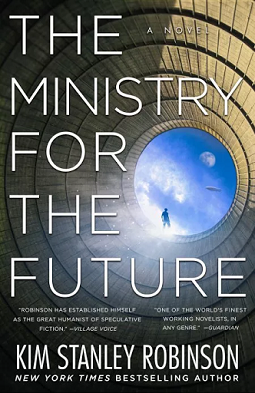The Ministry for the Future follows the history of the eponymous ministry created by the UN in 2025 to represent the interests of future people when addressing #ClimateChange; given that the solutions to climate change will take effect over hundreds of years, so don't immediately benefit the current generations, the ministry would speak for future generations in order to ensure long-term thinking is applied.
The novel has three main characters: Frank, who we meet in the first traumatising chapter, is an American relief worker, and the only survivor of an Indian town struck by a devastating heatwave that wipes out millions. Frank suffers the rest of his ruined life with acute PTSD, which drives him ever more desperately find ways to avoid such a catastrophe from repeating. Early in the novel, it spurs him to actions that introducing us to the second main character:
Mary, an Irish lifetime diplomat, is the Minister for the Future, a role that make her a target for activists from both sides of the climate struggle, and requires her to assemble and coordinate a team to establish legal standing for future generations, and promote solutions that protect them.
The novel interleaves short chapters between Frank and Mary and the third main character: The Situation Itself. This unusual character's chapters are either extremely short whom-am-I riddles that impart a set of disparate but germane concepts, or they are vignettes told from the perspective of unnamed witnesses to some aspect of climate change's effects or solutions.
Appreciating that the story is global, vast, and epic helps to understand that this apparently scattershot narration style is a cleverly devised mechanism (and maybe the only way) to ensure that the novel includes everything needed to grasp the problem and its solutions. Indeed, in parts it's so saturated that it reads like a draft of a #CliFi novel, with long lists and shorthand notes, that was rushed to print before some of the chapters were fleshed out, and maybe before some of the events played out in reality!
The novel is somehow both harrowingly realistic and implausibly optimistic, in that some of the manifold solutions involve changes that just seem impossible to achieve. But Robinson already understands my pessimism and dread:
"... the order of your time feels unjust and unsustainable and yet massively entrenched, but also falling apart before your eyes. The obvious contradictions in this list might yet still describe the feeling of your time quite accurately…"
On reflection, although it may be naive, it's also possible the exact formula we need in order to confront inexorable, nonfictional climate change that is definitely already arriving.









